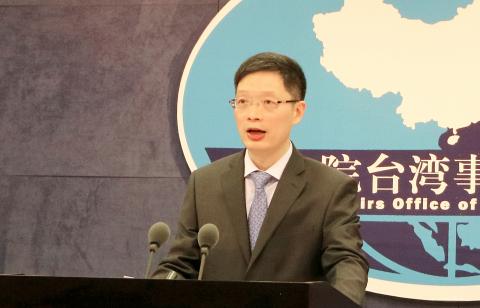China’s Taiwan Affairs Office (TAO) yesterday said Beijing has extended economic benefits and subsidies to Taiwanese businesses, civic groups, cultural workers and artists in China that were previously exclusively for Chinese citizens, a step that critics said represents an escalation in Beijing’s use of “united front” tactics.
Hailing the measures as “unprecedented,” TAO spokesman An Fengshan (安峰山) said the 31 incentives, effective immediately, would allow “Taiwanese compatriots to share in the opportunities arising from China’s economic development.”
The incentives seek to bring an “equality of opportunity” to Chinese and Taiwanese who are studying, starting businesses, working or living in China, An said.

Photo: CNA
The policy applies to Taiwanese businesses and entities involved in a wide variety of commercial and noncommercial activities.
The incentives include permitting Taiwanese firms to invest in Chinese businesses, receive tax breaks, participate in the “Made in China 2025” initiative and National Key Research and Development Programs, bid for government procurement contracts, and manage semi-public enterprises, the TAO said.
Beijing is also encouraging the involvement of Taiwanese entrepreneurs in the Belt and Road Initiative, particularly in China’s midwestern and northeastern regions, it said.
Taiwanese-owned agricultural entities are to receive the same subsidies and benefits that are available to their Chinese counterparts, it added.
Taiwanese are now eligible to enroll in certification exams for 134 professions and become members of Chinese industry associations and trade groups to “take part in work at the grassroots level,” the TAO said.
Beijing is to relax restrictions on cross-strait cooperation in film and TV productions to facilitate collaboration, it said, adding that restrictions on Taiwanese publications and films marketed in China have been removed.
Taiwanese are now eligible to register for and win prizes and awards in the Chinese Cultural Heritage Development Excellence competition, it added.
The 31 incentives were “tailor-made” for Taiwanese, he said.
The Mainland Affairs Council said that it was aware of Chinese efforts to induce Taiwanese to trade political recognition for profit and that it would be on alert regarding such developments and their potential effects on Taiwanese industry and skilled workers.
Such endeavors over the past few years have been attempts to turn Taiwanese by trying prove the validity of China’s claims, the council said.
Taipei has placed significant emphasis on policies that would improve Taiwan’s economy, grow its technology industry and foster skilled workers among the younger generation, it said.
The council called on China to work toward introducing mutually beneficial policies that are free of political manipulations, saying that only then could benign cross-strait interactions be maintained.
Many of the measures and policies announced by China require interagency collaboration, so whether Beijing actually has such plans and the actual rate of implementation of such policies remains to be seen, the council said.
The council cautioned Taiwanese that there are differences in systems, regulations, market environment and values across the Taiwan Strait, saying that they should be circumspect in their risk assessment to maintain their rights and safety.
Additional reporting by CNA

SECURITY: As China is ‘reshaping’ Hong Kong’s population, Taiwan must raise the eligibility threshold for applications from Hong Kongers, Chiu Chui-cheng said When Hong Kong and Macau citizens apply for residency in Taiwan, it would be under a new category that includes a “national security observation period,” Mainland Affairs Council (MAC) Minister Chiu Chui-cheng (邱垂正) said yesterday. President William Lai (賴清德) on March 13 announced 17 strategies to counter China’s aggression toward Taiwan, including incorporating national security considerations into the review process for residency applications from Hong Kong and Macau citizens. The situation in Hong Kong is constantly changing, Chiu said to media yesterday on the sidelines of the Taipei Technology Run hosted by the Taipei Neihu Technology Park Development Association. With

CARROT AND STICK: While unrelenting in its military threats, China attracted nearly 40,000 Taiwanese to over 400 business events last year Nearly 40,000 Taiwanese last year joined industry events in China, such as conferences and trade fairs, supported by the Chinese government, a study showed yesterday, as Beijing ramps up a charm offensive toward Taipei alongside military pressure. China has long taken a carrot-and-stick approach to Taiwan, threatening it with the prospect of military action while reaching out to those it believes are amenable to Beijing’s point of view. Taiwanese security officials are wary of what they see as Beijing’s influence campaigns to sway public opinion after Taipei and Beijing gradually resumed travel links halted by the COVID-19 pandemic, but the scale of

A US Marine Corps regiment equipped with Naval Strike Missiles (NSM) is set to participate in the upcoming Balikatan 25 exercise in the Luzon Strait, marking the system’s first-ever deployment in the Philippines. US and Philippine officials have separately confirmed that the Navy Marine Expeditionary Ship Interdiction System (NMESIS) — the mobile launch platform for the Naval Strike Missile — would take part in the joint exercise. The missiles are being deployed to “a strategic first island chain chokepoint” in the waters between Taiwan proper and the Philippines, US-based Naval News reported. “The Luzon Strait and Bashi Channel represent a critical access

Pope Francis is be laid to rest on Saturday after lying in state for three days in St Peter’s Basilica, where the faithful are expected to flock to pay their respects to history’s first Latin American pontiff. The cardinals met yesterday in the Vatican’s synod hall to chart the next steps before a conclave begins to choose Francis’ successor, as condolences poured in from around the world. According to current norms, the conclave must begin between May 5 and 10. The cardinals set the funeral for Saturday at 10am in St Peter’s Square, to be celebrated by the dean of the College